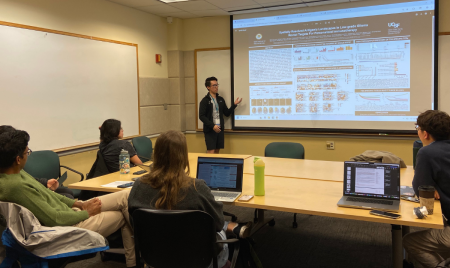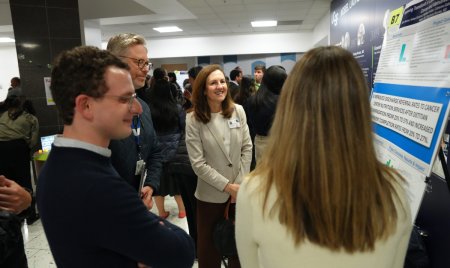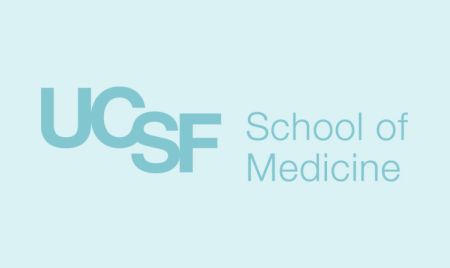Second-Year UCSF Medical Students’ Research on Display at Summer Explore Symposium

Ben Hyams, MS2, presents his research, “Large Language Models (LLMs) for Acute Hospitalization Risk Prediction During Radiation Therapy,” during the 2024 Summer Explore Symposium in December 2024
In mid-December, 104 second-year UCSF medical students presented their research at the Summer Explore Symposium, a four-day event hosted by the Inquiry Curriculum at the UCSF Parnassus Heights campus. Faculty experts led student poster sessions, covering a wide range of qualitative and quantitative research topics, from using CRISPR to assess protein function to validating cardiac risk scores in maternal congenital heart disease and applying AI in care delivery.
For the first time, first-year medical students participating in the Inquiry Immersion course attended the Symposium, observing presentations and participating in Q&A sessions. This experience provided insight into the research opportunities available through the Summer Explore program.
As part of UCSF’s mission to develop medical students from consumers to producers of knowledge, the Inquiry Office funds the Summer Explore Research Fellowship, an eight-week period of medically related research carried out between the first and second year of medical school. The fellowship provides students with research mentors, inquiry advisors, and a $5,000 stipend. While most participants received funding through Summer Explore, others were supported by internal grants such as the Benioff Homelessness and Housing Initiative Awards, Curriculum Ambassador Program (CURAM), Diane Sklar Global Health Initiative Fund, Greenberg Oncology Medical Student Summer Fellowship, Harold Varmus Endowed Fund for Global Health Scholars, Nebiyu Tegegn Scholarship Fund, Prof-Path, and mentor funding.
During the symposium, five outstanding medical student-researchers received the Dean’s Prize in Short-Term Research, chosen based on the strength of their abstract and a successful presentation to the faculty review committee.
Reflecting on his experience, Dean’s Prize winner Daniel Zager, shared, “Summer Explore allowed students to take control of their own research projects, even if they did not have much previous research experience. Since the program provided guidance on evaluating a possible project and choosing a mentor, I felt well-prepared to succeed from the start. The stipend allowed me the time to focus on the quality of my research and learning experience.”
Fellow awardee Isaac Avila-Vargas added, “My mentor was dedicated to helping me grow as a new investigator in the field. He encouraged me to push myself in learning new skills that will contribute to my research now and in the future.”
Dean's Prize in Short-Term Research Awards
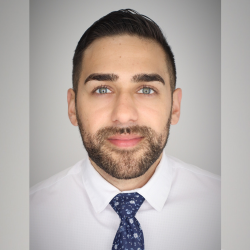
Isaac Avila-Vargas, mentored by Michael Peluso, MD, MHS and funded by his mentor and the ZSFG Division of HIV, Infectious Disease and Global Medicine.
Clinical and Virological Outcomes of an ART Interruption in Treated Controllers and Non-controllers
Isaac likes the scientific approach to inquiry and using data-driven evidence to find answers and new insights. Their research interests are in HIV, Oncology, health equity, and advancing care for underserved and marginalized populations. Being a member of the communities that have historically faced health disparities with HIV, they aim to help find a cure for HIV in their lifetime. Their research project involved exploring the early viral dynamics of spontaneous and post-intervention HIV control as well as analyzing the safety of a highly monitored Antiretroviral therapy (ART) ART Treatment Interruption (ATI) trial in people with HIV. They found that both spontaneous and post-intervention control of the virus was similar and that the ATI study was well tolerated, suggesting a potential strategy for an HIV cure. Isaac sees research as a valuable tool in the advancement of medicine and plans to continue clinical research and research that advances health equity throughout his career.
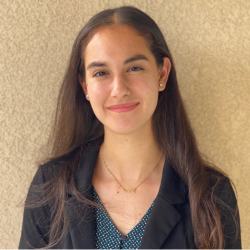
Lizeth Estrada, mentored by Emily Bergsland, MD and funded by the Summer Explore Research Fellowship
Characterization of Early-onset Gastroenteropancreatic Neuroendocrine Neoplasms at UCSF
Lizeth enjoys the creativity involved in crafting novel research questions and exploring patient stories to improve patient care. Her research interests include Immunology, Cancer Genetics, targeted therapies, and health disparities. Her first-year clinical preceptorship experience working with a young patient diagnosed with stage 4 colon cancer challenged her assumptions about colon cancer and opened her eyes to the rising prevalence of early-onset cases.
Her research project focused on clinicopathologic and demographic features of early-onset gastroenteropancreatic neuroendocrine neoplasms (GEP-NENs) at UCSF. She found that at UCSF, early-onset GEP-NENs account for 26% of cases and are predominantly low-grade, well-differentiated, and locoregional at diagnosis and that there is a relatively high incidence of germline mutations in early-onset GEP-NENs (particularly Pan-NENs). This highlights the potential value of germline testing in this population. Lizeth plans to draft a manuscript for her project and continue her research work in Deep Explore.
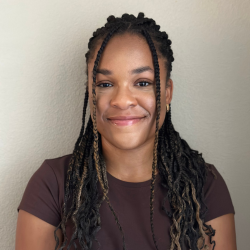
Danielle Houston, mentored by Sarah Roberts, DrPH and funded by the Summer Explore Research Fellowship.
What Ethical Principles are Providers Implicitly and Explicitly Applying to their Decision-making Process to Report or Not Report People to Government Agencies?
Danielle enjoys research because it provides valuable information about best practices for care and is an important medium for improving health care for all, especially patients of color. She wants to pursue qualitative work with pregnant people, focusing on Black birthing people. Prior to medical school, she obtained a MPH in Social, Behavioral, and Population Sciences with a certificate in Maternal and Child Health.
Her Summer Explore research project focused on reporting practices of providers who worked with pregnant and birthing people. She assessed if there was a difference in how providers who worked with pregnant and birthing people thought about reporting after the U.S. Supreme Court Dobbs decision. This includes cases like self-managed abortion and other situations like alcohol and drug use during pregnancy, mental health concerns, and abuse. She learned that providers commonly employed ethical principles to make their decisions, and their decision-making had not changed since the Dobbs decision. Danielle plans to write a manuscript on her findings and incorporate research into her future clinical practice.
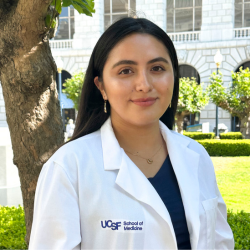
Grecia Ortiz Flores, mentored by Allan Basbaum, PhD and Sakeen Kashem, MD, PhD and funded by PROF-PATH Summer Explore Research Fellowship.
Modulation of Itch and Inflammation in Prurigo Nodularis Through Cannabinoid Type 1 Receptor
Grecia Ortiz Flores enjoys the research process of uncovering new insights that can directly impact patient care and advance our understanding of complex conditions to drive meaningful change, particularly regarding under-researched topics and diseases affecting underserved populations. She is interested in dermatology and addressing disparities in inflammatory skin conditions affecting skin of color.
Driven by her desire to address health disparities in dermatology, she was inspired by the potential to identify novel therapeutic targets such as Cannabinoid Type 1 Receptor (CB1R) agonists. Her research investigated the role of CB1R in modulating itch and inflammation in Prurigo Nodularis, a multifactorial chronic inflammatory skin condition that disproportionately affects skin of color. She found that a novel CB1R agonist discovered at UCSF significantly reduced itching and inflammation in wild-type mice, highlighting CB1R as a potential therapeutic target. Grecia plans to further investigate the mechanisms by which CB1R modulates itch and inflammation, with the goal of setting the foundation for the translation of these findings into clinical trials. Ultimately, she aims to integrate research into her clinical practice, focusing on health equity and the advancement of under-researched topics.
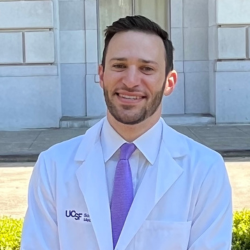
Daniel Zager, mentored by Kartika Palar, PhD, MA and funded by the Summer Explore Research Fellowship
Effects of an Urban Garden and Peer Nutritional Counseling Intervention on Diet Among People Living with HIV and Food Insecurity in the Dominican Republic
Daniel likes how research offers a window to understand the lives of patients in ways that may not be appreciated in a clinical setting. Their research interests revolve around health disparities and examining the ways in which marginalized populations access health care. Their background as a Puerto Rican and a native Spanish speaker motivated them to investigate the experiences of people like them, who are underrepresented in research samples and have more barriers to care.
Their research project studied the relationship between participation in an urban gardening and peer nutrition counseling intervention and diet quality among people living with HIV and food insecurity in the Dominican Republic. They found that urban gardening and peer nutrition counseling intervention may have resulted in increased consumption of vegetables and proteins and decreased consumption of sweets when compared to the control group. This type of intervention may be a sustainable way of improving diet quality among people living with HIV and food insecurity in the Dominican Republic. Daniel is interested in expanding their summer research project and pursuing research opportunities on U.S.-based projects centered around issues of immigration or incarceration.
Faculty Mentor Awards
In addition to student awards, Exceptional Mentorship Awards were given to recognize the special dedication of UCSF mentors to nurture leaders, innovators, advocates, and researchers at UCSF. This year’s awardees are:
Andrew Bishara, MD, Assistant Professor of Anesthesia
Christi Butler, MD, Assistant Professor of Urology
Jolie Chang, MD, Professor of Otolaryngology
Arpita Desai, MD, Assistant Professor of Medicine
Maggie Chung, MD, Assistant Professor of Radiology
Sasha Gorrell, PhD, Assistant Professor of Psychiatry
Sakeen Kashem, MD, PhD, Assistant Professor of Dermatology
Michael Lipnick, MD, Professor of Anesthesia
Anthony Muiru, MD, MPH, Assistant Professor of Medicine
Nandini Palaniappa, MD, Associate Professor of Anesthesia
Kartika Palar, PhD, MA, Associate Professor of Medicine
Michael Peluso, MD, MHS, Assistant Professor of Medicine
Jay Stewart, MD, Professor of Ophthalmology
Amanda Twigg, MD, Associate Professor of Dermatology
Lena Winestone, MD, Associate Professor of Pediatrics
